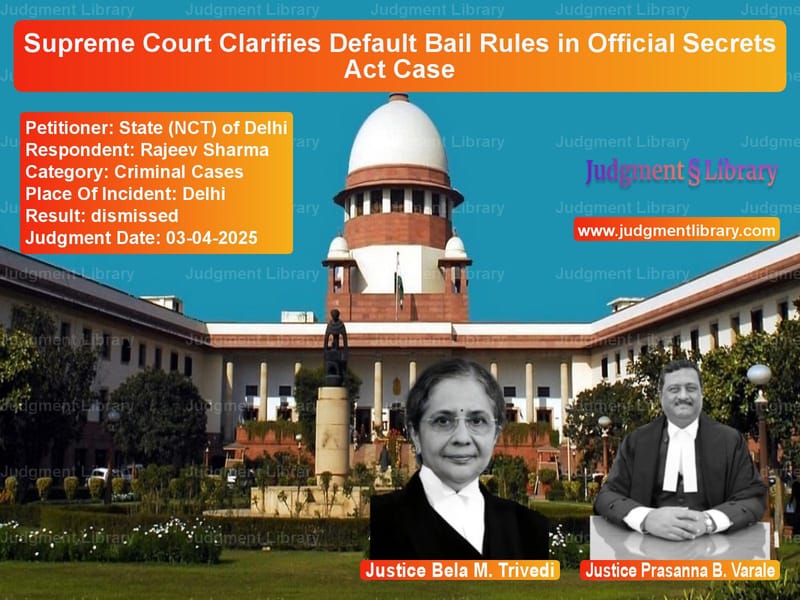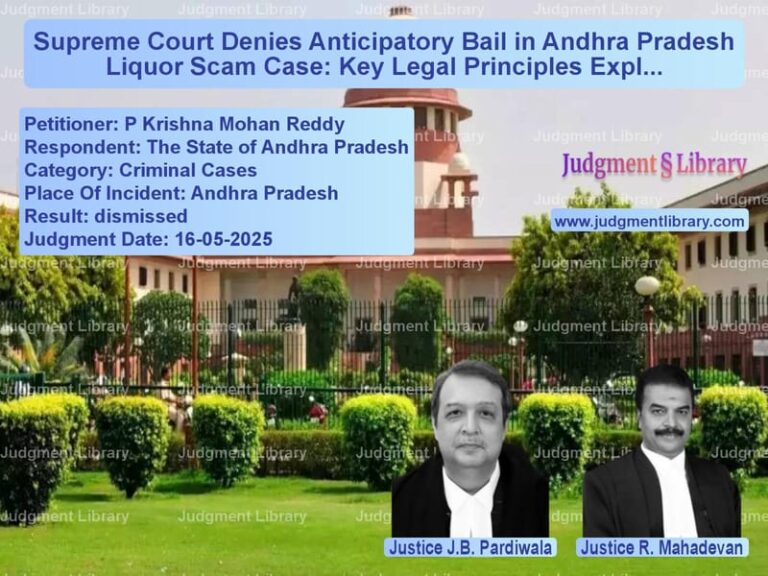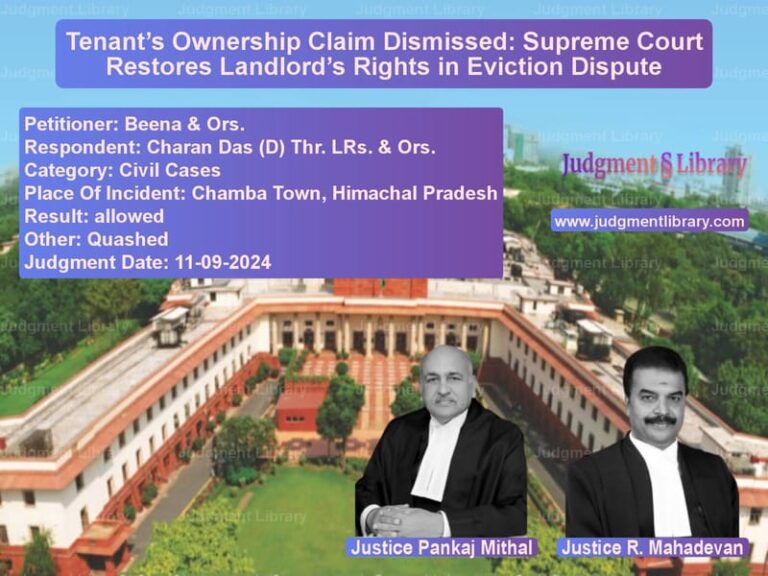Supreme Court Clarifies Default Bail Rules in Official Secrets Act Case
The Supreme Court of India recently delivered an important judgment in State (NCT) of Delhi v. Rajeev Sharma, upholding the Delhi High Court’s decision to grant default bail to an accused charged under the Official Secrets Act, 1923. The judgment provides crucial clarification on the interpretation of Section 167(2) of the Code of Criminal Procedure (CrPC) regarding default bail provisions.
Case Background
The case originated from FIR No. 230/2020 registered at Delhi’s Special Cell Police Station on September 13, 2020, against Rajeev Sharma for offenses under Sections 3, 4, and 5 of the Official Secrets Act, 1923, along with Section 120B (criminal conspiracy) of the Indian Penal Code. The key timeline of events was:
- September 14, 2020: Rajeev Sharma arrested
- Multiple bail applications rejected by lower courts between September-October 2020
- November 14, 2020: Sharma files for default bail under Section 167(2) CrPC claiming 60-day investigation period had lapsed
- November 16, 2020: Delhi High Court grants bail in Criminal Revision Petition No. 363/2020
- State appeals to Supreme Court against the bail order
Legal Question
The core legal issue before the Supreme Court was:
“Whether the term ‘imprisonment for a term not less than 10 years’ in clause(i) of proviso(a) to Section 167(2) CrPC would include an offence where the punishment of 14 years imprisonment is prescribed, but no minimum period of imprisonment is prescribed for such offence?”
Supreme Court’s Analysis
The bench comprising Justices Bela M. Trivedi and Prasanna B. Varale analyzed Section 167(2) CrPC which states:
“(i) ninety days, where the investigation relates to an offence punishable with death, imprisonment for life or imprisonment for a term of not less than ten years; (ii) sixty days, where the investigation relates to any other offence…”
The Court noted that while Section 3 of the Official Secrets Act prescribes a maximum punishment of 14 years, it doesn’t specify any minimum punishment. The Court relied heavily on its earlier three-judge bench decision in Rakesh Kumar Paul v. State of Assam (2017), which held:
“The words ‘not less than’ occurring in clause(i) to proviso(a) of Section 167(2) CrPC must be given their natural and obvious meaning, which is to say, not below a minimum threshold… these words must relate to an offence punishable with a minimum of 10 years’ imprisonment.”
The Court further observed:
“Where minimum and maximum sentences are prescribed, both are impossible depending on the facts of the cases… Merely because minimum sentence is provided that does not mean that the sentence imposable is only the minimum sentence.”
Key Findings
- The phrase “not less than 10 years” in Section 167(2) CrPC requires a prescribed minimum sentence of 10 years, not just a maximum sentence exceeding 10 years.
- Since the Official Secrets Act offenses in question had no minimum prescribed sentence (only maximum of 14 years), the 60-day default bail rule applied, not the 90-day rule.
- The investigation wasn’t completed within 60 days, making Sharma entitled to default bail.
- The High Court correctly followed precedent in granting bail.
Final Decision
The Supreme Court dismissed the State’s appeal, upholding the High Court’s bail order. However, it directed the trial court to expedite the proceedings:
“The Trial Court is directed to proceed further with the trial as expeditiously as possible and in accordance with law.”
Significance of the Judgment
This judgment:
- Clarifies the interpretation of “not less than” in default bail provisions
- Reaffirms the importance of statutory bail rights when investigations exceed time limits
- Maintains consistency with previous Supreme Court rulings on default bail
- Balances state security interests with individual liberty protections
The decision serves as an important reminder of the judiciary’s role in safeguarding fundamental rights even in cases involving serious national security allegations.
Petitioner Name: State (NCT) of Delhi.Respondent Name: Rajeev Sharma.Judgment By: Justice Bela M. Trivedi, Justice Prasanna B. Varale.Place Of Incident: Delhi.Judgment Date: 03-04-2025.Result: dismissed.
Don’t miss out on the full details! Download the complete judgment in PDF format below and gain valuable insights instantly!
Download Judgment: state-(nct)-of-delhi-vs-rajeev-sharma-supreme-court-of-india-judgment-dated-03-04-2025.pdf
Directly Download Judgment: Directly download this Judgment
See all petitions in Bail and Anticipatory Bail
See all petitions in Terrorist Activities
See all petitions in Cyber Crimes
See all petitions in Fraud and Forgery
See all petitions in Judgment by Bela M. Trivedi
See all petitions in Judgment by Prasanna Bhalachandra Varale
See all petitions in dismissed
See all petitions in supreme court of India judgments April 2025
See all petitions in 2025 judgments
See all posts in Criminal Cases Category
See all allowed petitions in Criminal Cases Category
See all Dismissed petitions in Criminal Cases Category
See all partially allowed petitions in Criminal Cases Category







